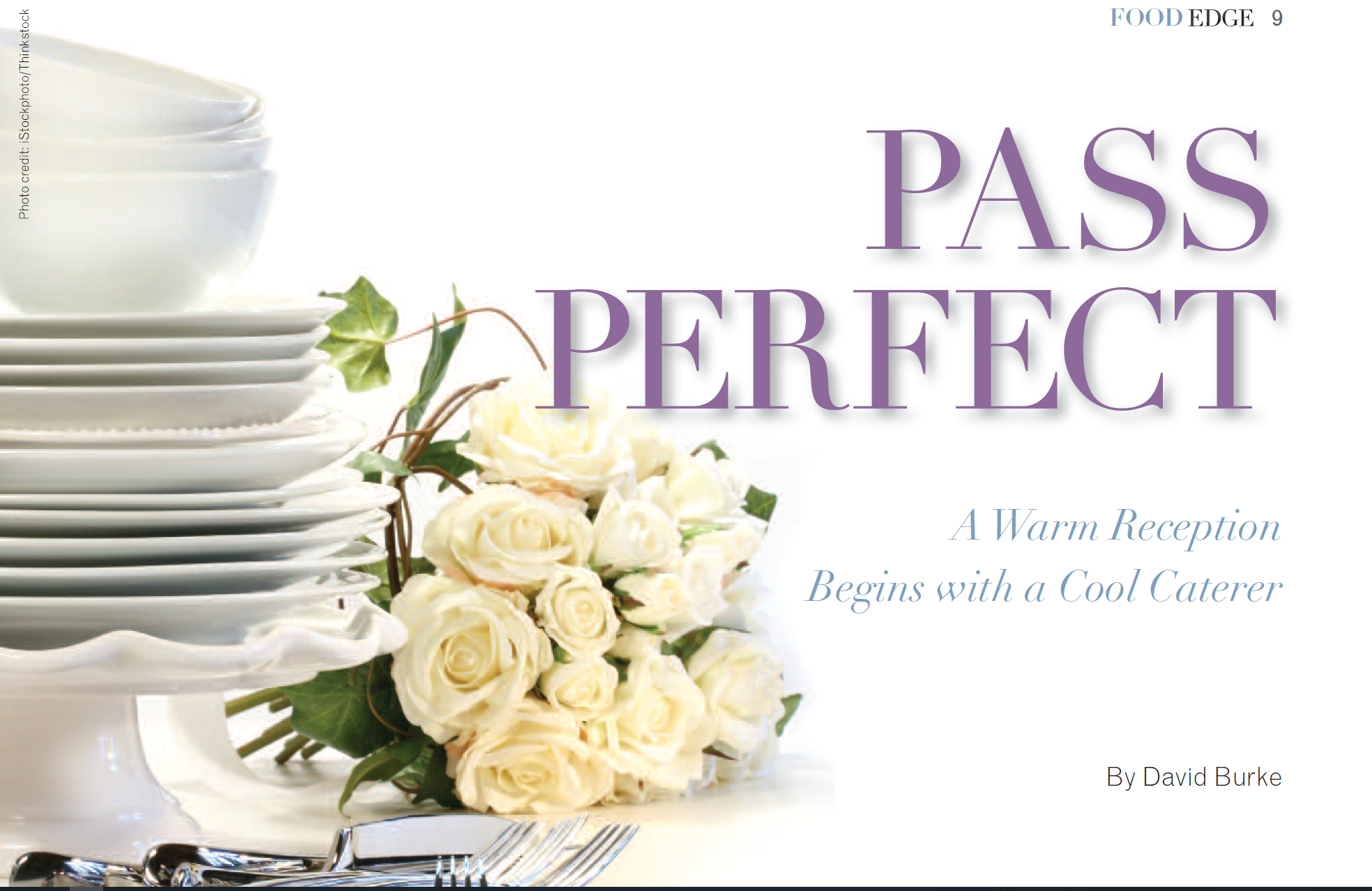A Warm Reception Begins with a Cool Caterer
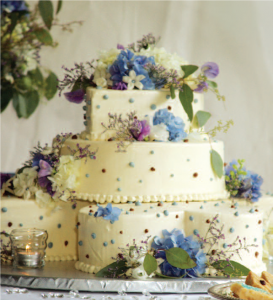
Photo credit: iStockphoto/Thinkstock
Call me biased but I think great, memorable food is the key ingredient in a great, memorable wedding reception. It’s not just me. I know people who were married decades ago who can’t name half their wedding guests, but they can tell you to this day in excruciating detail what they thought of the food. Pick the right caterer for the right reasons and you’ll be golden. Choose the wrong one and, well, let’s not go there. Most people know me as a restaurateur or “celebrity chef” so they are surprised when they’re doing that first bit of wedding research and my name suddenly pops up as someone who caters receptions. So are people from this area who approach me at David Burke Kitchen in New York, or at Fromagerie in Rumson, looking for a catering recommendation.
I like to do weddings and other big events outside of my restaurants. I’ve got an entire staff devoted to catering now, and it’s becoming an increasingly important part of my business. Think about it. If I am pulling out all the stops for 150 people and creating a totally unique wedding experience, maybe only a fraction of those guests have been to one of my places. So when we do a great job, it’s a powerful advertisement for the restaurants—and, of course, for future weddings and other events, like fundraising galas. By the same token I do have an advantage in this business in that the couple that contacts me has almost certainly experienced my menu before and liked it.
Consequently, that first conversation isn’t so much a selling opportunity as an opportunity to ask them what they love about my food and how they envision incorporating it into their event. That being said, I also know that those same folks may also be considering two or three other competing options, so I still have to make them go Wow! In fact, I think when you go shopping for a wedding caterer you should set the bar high—make them make you go Wow! For me, the wow factor is all about coming up with really cool ideas, ideas that go beyond what any other caterer might think of. I hate handing out a menu and saying, “Here, pick one of these.” I want to create a unique wedding. I’m not afraid to take chances, and if the couple thinks the same way then we can do some fun stuff.
That’s why I think it’s crucial to get a read on their personalities and their shared experiences, and use that as a springboard. I like to know where they met and what was their first meal together. You never know where that first bit of inspiration will come from. But once you’ve got that, you build it out to include the food, the cake, the table settings and the gift bags. One thing I try to encourage clients to do is think about elements of interactivity and craftsmanship. It might be an artist carving an ice sculpture during the reception. It might be meringue floating on balloons. It might be a kitchen tour—people are so curious about food and what chefs are doing. The wedding cake is always an interactive experience, but why not take that to the next level? Everyone assumes a cake has to be made days in advance.
That’s not necessarily the case. We can bring in a master baker to create the cake during the wedding, and guests can actually have a hand in the finishing touches. And who doesn’t like to lick the bowls? We can set it up so everyone “licks the bowl” at their tables. Of course, fewer and fewer weddings these days are what I’d call traditional sit-down affairs. A lot of conversations I have begin with, “I want something different than a fully plated meal.” They don’t want people to feel stuck to the table. However, the fact is that there is almost always some sort of sit-down component—and the main course choices do need to be somewhat traditional, because your goal there is to please as many people as possible. You can’t put skate or bluefish or sweetbreads on the menu. But that doesn’t mean you play it safe, either. On the contrary, we can do some eye-opening things within the confines of chicken-salmon-filet-vegetarian. If someone says let’s do prime rib and baked potato, fine, we’ll sex it up and make it modern. It’ll be the best they ever had. By the same token, if someone wants burgers or meat loaf or some other comfort food at a wedding, we’ll do it. That’s what we’re all about. I was thinking that I’d love to do a breakfast wedding. Has anyone ever tried that before? I wonder. This shifting focus on creating a series of extraordinary hors d’oeuvres I think is fantastic. Anyone who knows me knows that I love that kind of challenge. Ideally, I like to do eight to ten at a reception. It gives us a chance to show off.
Making the Call The ideal time to pick your wedding caterer is six to nine months before the big day. The three pieces of information you’ll need are the venue you’ve selected for the reception, the number of guests you are expecting and a rough idea of your budget. It’s not crucial to have nailed down the exact date, but a range of dates is helpful. The items you can expect to cover in your initial meeting include the type of reception you envision and how the event will flow. Do you want to lean toward the traditional, or make it fun and interactive? Is there a theme or trend that you’re interested in exploring? What don’t you like? Have you seen pictures in a magazine or on the web of a reception that sparks your imagination? If so, bring them to the meeting. Needless to say, there will be a lot of discussion about food choices. Don’t expect to make any decisions at this first encounter. A caterer may make suggestions to get a feel for your preferences, but nothing is set in stone. After that initial meeting, there will be a lot of follow-up to solidify as many details as possible. From there, the caterer will propose a menu crafted to fit your tastes, your reception theme and your budget. It’s a good idea to arrange a tasting if anything is undecided, especially as you get a little closer to the date. We’re fortunate in that most of our wedding clients have eaten in my restaurants or are familiar with my food from other catered events.
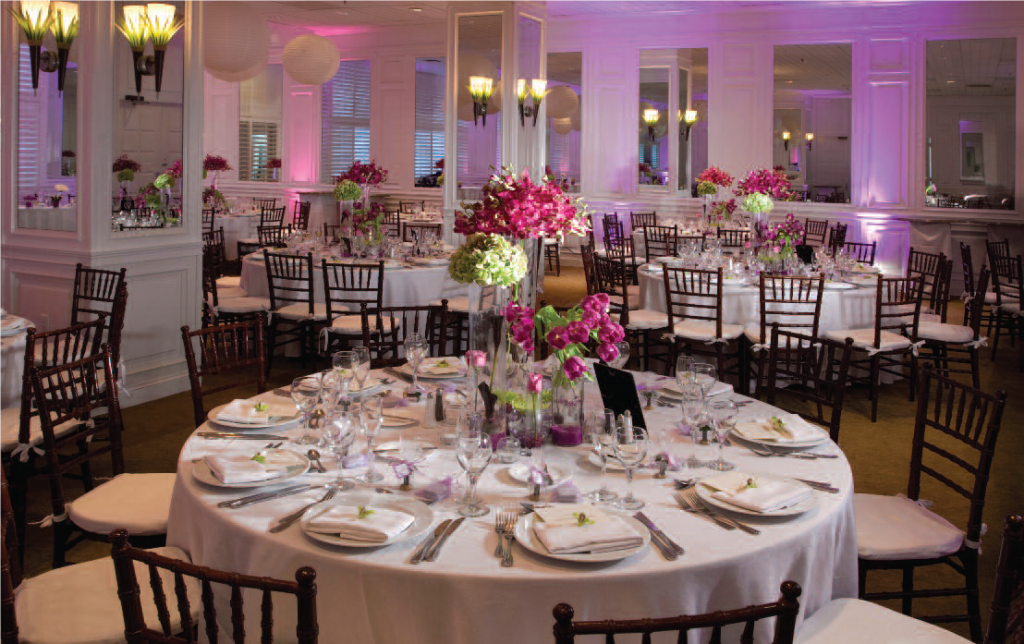
Photo credit: iStockphoto/Thinkstock
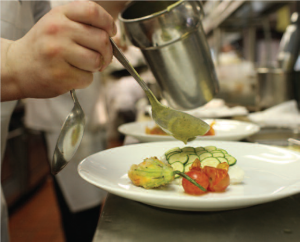
Photo courtesy of David Burke
Building a menu that pushes the envelope is the fun part of planning a wedding. The tricky part is making sure that your caterer can actually pull it off. We tend to end up working in venues with a lot of character but also a lot of quirks. It might be a museum in the city or a private estate in the country or a historic venue like Water Witch. Understanding the limits and the possibilities of these unique spaces is really important. It determines what equipment we truck in and how we staff an event. Don’t let caterers get away with saying, “No sweat, we got it covered”—especially in a space they haven’t worked in before. The devil is always in the details. Here are some rules of thumb. You’ll want one waiter for every 20 guests. You’ll want to make sure that there is a hierarchy in place. There should be a captain, a head bartender and someone in charge of the busing staff. That’s the front of the house.
Behind the scenes are the cooking and cleaning crews. For a wedding of 200 we typically bring at least six cooks and two or three people to keep the kitchen and prep areas clean and uncluttered. Don’t use a company you suspect is skimping on manpower. We usually err on the side of over-staffing events—we want to do such a good job, and that’s tough to do if you’re shorthanded. What else is reasonable to ask a wedding caterer to do? A caterer is not a party planner, but they can be helpful with details like flowers and audio/visual. I’d say we get involved in those areas—or at least make recommendations—about 15 percent of the time. We do work with party planners, probably at least 50 percent of the time. But nowadays a lot of people take on the wedding planning themselves. If they have opted not to go with a banquet hall, then they have already started down that path.
Sometimes in the eleventh hour the bride realizes she can’t handle it and she reaches out to us. We can usually see it coming, and we’re happy to help. So what should a catered reception cost? That’s the $64,000 question, isn’t it? If you care about food, obviously you want to devote as much of your budget as you can to making that part of your wedding memorable. If you want to transcend the basic beef-chicken-fish menu and make the food itself a series of unforgettable experiences, it comes with a price tag. But it’s not as much as you’d think. Depending on the venue you’ve booked, you’re probably going to end up between $150 and $300 a head. That number includes staff, rentals, etc. For this caliber of event—essentially the same party we’d do for the Whitney in New York—that is very competitive.
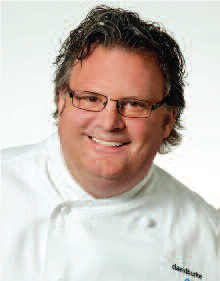 Editor’s Note: David owns David Burke Kitchen, David Burke Townhouse, Fishtail by David Burke and David Burke at Bloomingdales in New York, David Burke Fromagerie in Rumson, David Burke Prime in Connecticut and David Burke’s Primehouse in Chicago. www.davidburke.com
Editor’s Note: David owns David Burke Kitchen, David Burke Townhouse, Fishtail by David Burke and David Burke at Bloomingdales in New York, David Burke Fromagerie in Rumson, David Burke Prime in Connecticut and David Burke’s Primehouse in Chicago. www.davidburke.com

